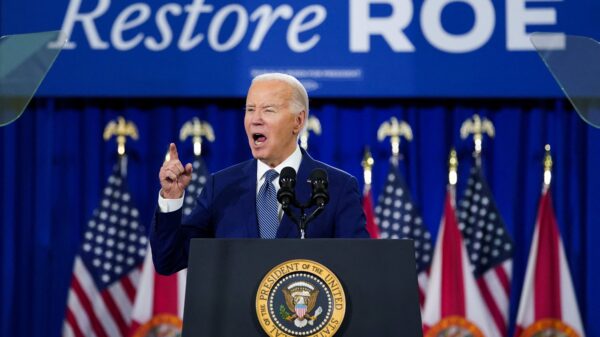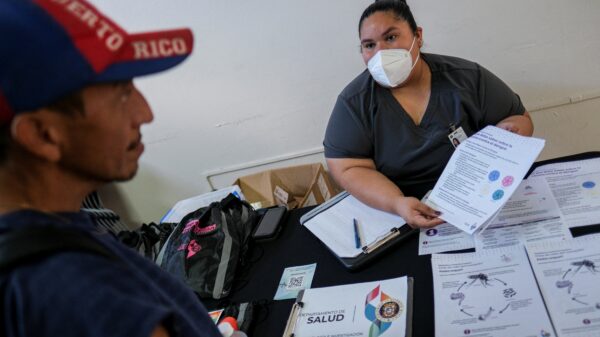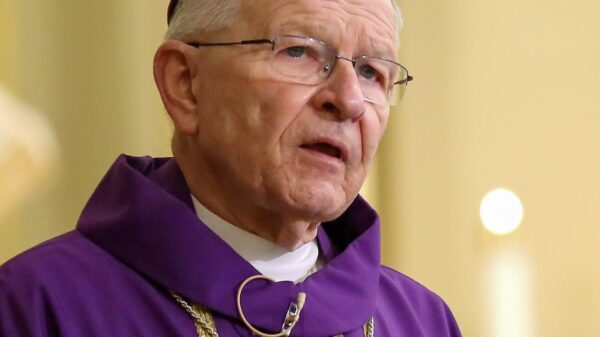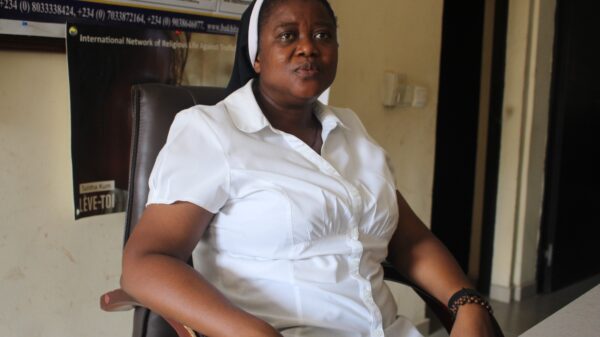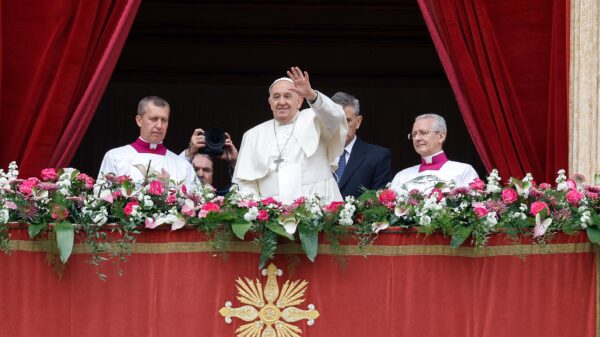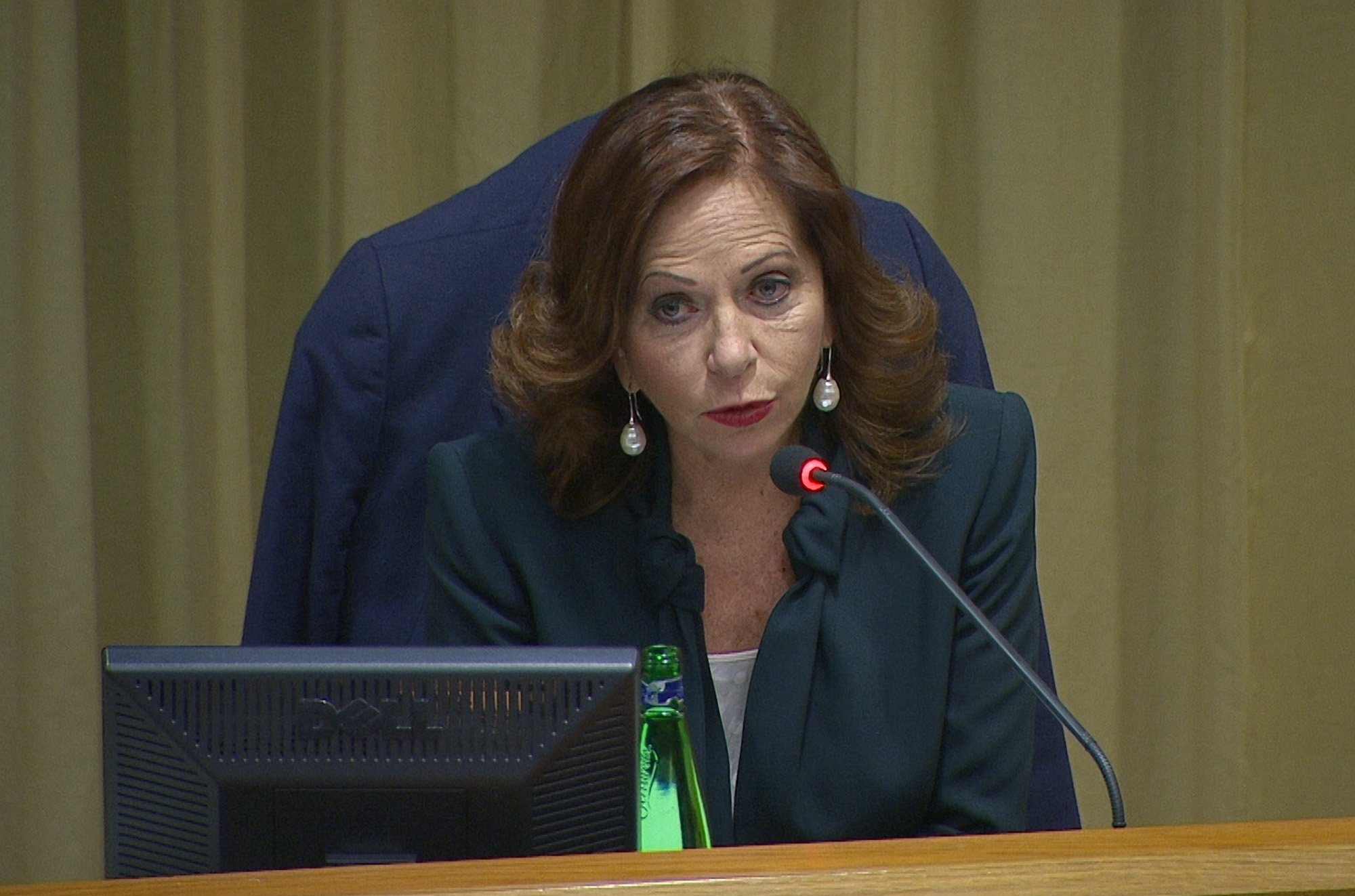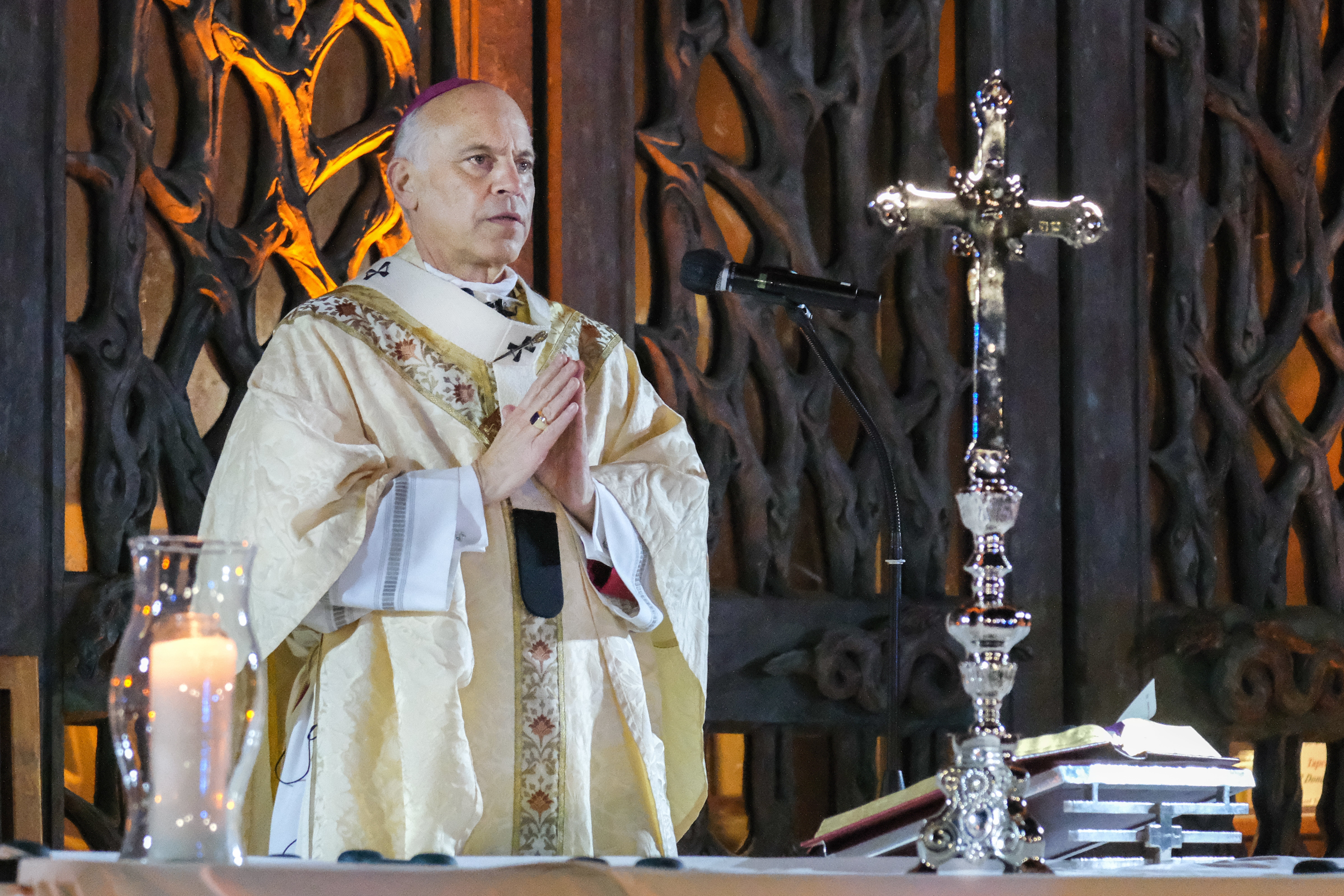(OSV News) — Exactly five years ago, on Feb. 23, 2019, the spotlight of the abuse summit in the Vatican was on one woman: Valentina Alazraki.
The veteran Mexican journalist, whose legacy was chronicled in her New York Times profile headlined: “5 Popes, 150 Papal Trips and One Stern Lecture for Bishops,” got a standing ovation from her fellow journalists in Sala Stampa, the Vatican press room, after she told the bishops to stop “playing the ostrich” and transparently communicate the abuse scandal.
But five years after the groundbreaking talk, transparency is still urgently needed, from Europe to Africa and from Asia to Latin America and to the Vatican itself.
“If you read just one speech from the abuse summit, make it this one,” the U.K.’s Catholic Herald headline read on Feb. 23, 2019, with The Associated Press stressing that “Alazraki, the longtime Vatican correspondent for Mexico’s Televisa, challenged the men in power to decide whether they are on the side of the victims, or the priests who raped them.”
“The faithful,” Alazraki said during her speech, “do not forgive the lack of transparency, because it is a new assault on the victims. Those who fail to inform encourage a climate of suspicion and incite anger and hatred against the institution.”
The Meeting for the Protection of Minors in the Church held Feb. 21-24, 2019, in the Vatican was attended by 180 participants, the vast majority of these presidents of bishops’ conferences from across the world. Reflecting on the theme of responsibility, transparency and accountability, it gathered speakers from around the globe and included testimonies of victims of abuse and the expertise of lay and religious women.
“The path of action has been clearly mapped out now that five years passed after the summit, but churches in different countries are moving faster or slower along it,” Alazraki told OSV News. “In some countries in Central America the processes are really, really slow. There are also, unfortunately, countries where the existence of clergy sexual abuse is still denied altogether.”
For Yago de la Cierva, a communications professor who teaches at the Pontifical University of the Holy Cross in Rome and author of a book on crisis management for the church, “the pope deserves a lot of praise” five years after the summit. “A — for including transparency among the main tools to fix the plague of sexual abuse of minors, and B — to invite an independent journalist to give that speech,” he told OSV News.
“Transparency was not just the cherry at the top of the cake but was one of the main layers of the whole cake,” he emphasized.
Introducing herself as journalist, woman and mother that day five years ago, Alazraki told the bishops, including the bishop of Rome, who was sitting next to her, they “should be aware that the more you cover up, the more you play ostrich, fail to inform the mass media and thus, the faithful and public opinion, the greater the scandal will be.”
“If someone has a tumor, it is not cured by hiding it from one’s family or friends; silence will not make it heal,” she said.
She also warned the bishops, “If you are against those who commit or cover up abuse, then we are on the same side. We can be allies, not enemies. We will help you to find the rotten apples and to overcome resistance in order to separate them from the healthy ones.
“But if you do not decide in a radical way to be on the side of the children, mothers, families, civil society, you are right to be afraid of us, because we journalists, who seek the common good, will be your worst enemies.”
She added that “abusing a minor is as contemptible as is covering up the abuse. And you know better than I that abuses have been covered up systematically, from the ground up.”
“In retrospect, Valentina’s was a message that the Vatican as well as the bishops needed to hear. The Rupnik case is a reminder that church leaders won’t necessarily move unless under pressure from public revelations,” Francis Rocca, Vatican correspondent for The Wall Street Journal, told OSV News, bringing up the case that is one of the most visible signs of how much there still needs to be done regarding transparency.
Father Marko Rupnik, an artist whose mosaics decorate churches and chapels at the Vatican and around the world, has been accused of sexually, spiritually or psychologically abusing more than 20 women and at least one man over a 40-year period. He was a Jesuit until June 2023, when the order expelled him for disobedience in connection with restrictions placed on his ministry.
Although the then-Congregation for the Doctrine of the Faith dismissed a case against Father Rupnik in October 2022 saying the statute of limitations had expired, a year later the Vatican press office announced Pope Francis lifted the statute of limitations to allow for a formal investigation of the case by the doctrinal office.
At the news conference in Rome Feb. 21, Gloria Branciani — who along with another alleged victim, Mirjam Kovac, decided to reveal her identity — said that although she had testified before both the Jesuits and the doctrinal office before the first case was closed, she had not been contacted again and did not know the status of the case.
Laura Sgrò, a civil and canon lawyer known for arguing high-profile cases at the Vatican and who is representing both women, said she thought the case was still at the doctrinal dicastery, but she was not certain.
“Five years after the abuse summit, the church still has not learned that transparency is the remedy to scandal, not the cause of it,” said Stephen White, executive director of The Catholic Project, an initiative from The Catholic University of America in Washington designed to foster effective collaboration between the church’s clergy and laity in the wake of the sexual abuse crisis.
“Obviously these kinds of cases require a certain degree of discretion and even confidentiality to protect both the accuser and the accused,” he told OSV News. “But the chronic lack of transparency about even basic procedural matters undermines confidence in leaders, erodes the rule of law, and casts a pall of suspicion over the whole of the church’s judicial system,” he said.
Father Rupnik’s victims called for a full inquiry into the case similar to the McCarrick report, commissioned by the Vatican to investigate how the church hierarchy was handling allegations against ex-cardinal and ex-priest Theodore McCarrick.
“This is a perfect parallel between Rupnik and McCarrick in the sense that the only way for transparency is a proper, official, thorough investigation that would be later communicated,” De la Cierva told OSV News.
“Once the McCarrick report was published — the case disappeared. Even if there was no punishment for anyone involved! Because it’s not about sanctions, it’s about the truth and the knowledge that will help with one thing — that it will not happen again,” De la Cierva said.
Alazraki gave concrete advice to the bishops at the end of her 2019 speech on how to make transparency happen. Starting with “put the victims in first place,” the list included also: “Allow yourselves to seek advice” and “Professionalize your communications,” the points she sees progress on but not definitive change.
“The most important thing is for the church to really, and I underline — really understand that victims must always be at the center of any action against abuse,” Alazraki told OSV News. “They need to be heard, understood, they need to be believed and helped in the healing process. Reparation is the first response to the harm done,” she said.
“The church must also accept that, unfortunately, it has lost a tremendous amount of credibility by covering up sex scandals,” she added. “And if the church doesn’t side with the victims, the media will not be an ally of the church. Supporting victims is work that the church can undertake precisely with journalists. People will not forgive lies and cover-ups, it needs to be said out loud over and over,” she said.
“In fact, I was told victims are still not in the center of the process in many countries,” Alazraki said.
Sources told OSV News that even if transparency is slowly picking up speed across the world, once the cases land in Rome in certain dicasteries handling them, they are stuck for years without any information about the process for the victims coming from the Vatican curia.
A lack of sharing of best practices within the church and the lack of professional communications protocols for abuse cases in many orders and dioceses around the world are other major problems, experts told OSV News.
A case in point is the lack of response OSV News received to an inquiry it sent to the Jesuit Curia in Rome regarding the case of Father Rupnik. On Oct. 26, 2023, OSV News asked Jesuit Father Johan Verschueren, identified as responsible for communications in the case of the Slovenian priest, about the Jesuit order’s reaction regarding Father Rupnik being incardinated in a Slovenian diocese and how this decision affects the credibility of the church. Father Verschueren responded that “as Marko Rupnik is no longer a Jesuit, I am no longer giving any comments on the case,” adding: “I would suggest to follow AP-news [The Associated Press] who procures correct data on the news.” An hour later, AP’s story was updated with Father Verschueren’s comments on the case. OSV News, however, never got the answer to its questions.
“Catholic media has a tremendous asset — it’s reaching people in our churches,” De la Cierva said. “The church either understands that or will lose a huge ally in communicating the abuse scandal, and in consequence — lose the faithful,” he stressed.
White said that “media — and especially Catholic media — plays a crucial role in the church when it comes to abuse. Catholic media helps hold leadership accountable when things go wrong. But Catholic media also helps tell the story fairly and with genuine insight, whether things go right or wrong. We need both; the church needs both,” he said.
“Accusing the media of exposing the scandals was another element of the church losing credibility,” Alazraki added.
In addition to the lack of media guidelines in church institutions, many cases, experts underline, are not so visibly put in the spotlight as the Rupnik case, and it’s particularly those cases that dioceses and orders should communicate properly.
In the most recent case that resurfaced in Poland, a Redemptorist priest was accused by an adult woman of abuse. As reported by Wiez magazine Feb. 22, the parish from which the priest was removed in the central Poland city of Torun announced to parishioners that “he has been appointed to new tasks.” “Thus, he is leaving Torun,” the parish said, leaving confused members of the ministry the priest had been running asking on social media to explain “what is going on.” One of the young Redemptorists answered on Facebook: “Ask the provincial.”
“The bishops present at the summit were one thing; the other is parish priests, communities, the people in the pews that need to know. They have a right to know why the priest was removed if there was a credible allegation,” De la Cierva told OSV News, stressing that American Catholics may think that “this is all done and set,” but “it is far from standard in the global church, and it’s Rome that should seek others to follow.”
The Holy Cross university expert however also is hopeful: “What we have seen after the summit in Rome is that the message of transparency was impregnated,” explaining that the “seed planted in February 2019 has grown in many places in the world.”
“They know they have to communicate and be transparent — although they are reluctant and there is resistance. The main goal of the summit was to change the mindset. They know they should do it, the problem is — it’s not easy to implement it,” he said.
Paulina Guzik is international editor for OSV News. Follow her on X at @Guzik_Paulina. CNS Rome contributed to this report.


